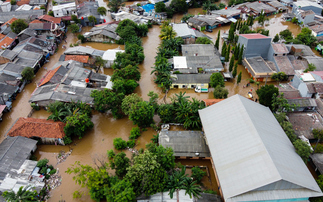US President calls for countries to agree to ratcheting mechanism for carbon reduction targets
US President Barack Obama has demanded that a global climate change deal signed in Paris this month should include legally binding requirements for countries to review their carbon reduction targets.
Speaking to reporters on his two-day trip to the French capital, the President waded into an ongoing row over the legal nature of the proposed climate change deal.
During a meeting with small island states today, he said it was critical that countries agree to "periodic reviews" of the voluntary national carbon goals they have put forward ahead of the summit, adding that these reviews must have legally status.
"Although the targets themselves may not have the force of treaties, the process, the procedures that ensure transparency and periodic reviews, that needs to be legally binding," he told reporters. "And that's going to be critical in us having high ambitions and holding each other accountable."
Obama also expressed optimism that an ambitious climate change deal could be delivered over the next two weeks, declaring that despite on-going challenges "I actually think were gonna solve this thing".
Last month, the European Union sparked a row with US Secretary of State John Kerry after he insisted any agreement reached this month was "definitively not going to be a treaty". The EU's climate commissioner Miguel Arias Cañete countered that the Paris deal must be an international legally-binding agreement.
The US government is opposed to the creation of a new treaty that would require Congressional approval that it is highly unlikely to secure. However, there remains room for a compromise given elements of any agreement, such as the proposed review mechanism, could be put on a legal footing without the need for a Congressional vote.
Nearly 190 countries have submitted national climate action plans, known as intended nationally determined contributions (INDC), that they have pledged to deliver under a global climate deal. These action plans will not be legally binding and countries will face no direct penalties if they fail to meet them.
Most parties at the Paris talks want countries to carry out a stocktaking of their INDCs on a five or 10-yearly basis. But the UK, Europe and US want countries to go one step further and formally review their targets, to see if they can be strengthened as new clean technologies emerge or climate impacts escalate.
The proposal is likely to face opposition from some leading emerging economies, who fear a formal review system could see them face increased pressure to curb their emissions.
Kumi Naidoo, executive director of Greenpeace, backed Obama's call for a legally-binding review mechanism.
"President Obama has clearly supported a process to make international carbon emission pledges more ambitious over time," he said in a statement. "This is absolutely critical if what is on the table here in Paris is to be improved, so that we can stay within the 1.5 C degree target which the most vulnerable countries have called for here."
However, he criticised Obama's call today for the global economy to become low carbon over the course of the century, warning that it falls short of what is needed to keep temperatures to below 2C.
"Last June as a member of the G7, he signed up to a goal to decarbonize the global economy this century. It's taken less than six months for him to roll back on that ambition," he added. "To remain credible, he needs to support the vulnerable countries who have just called for all energy to be renewable energy by 2050, and the complete decarbonisation of the global economy."
Reports earlier today suggested India and China remain opposed to proposals to include a "decarbonisation" commitment in the negotiating text, which is currently being reviewed by officials.
This article is part of BusinessGreen's Road to Paris hub, hosted in association with PwC.









